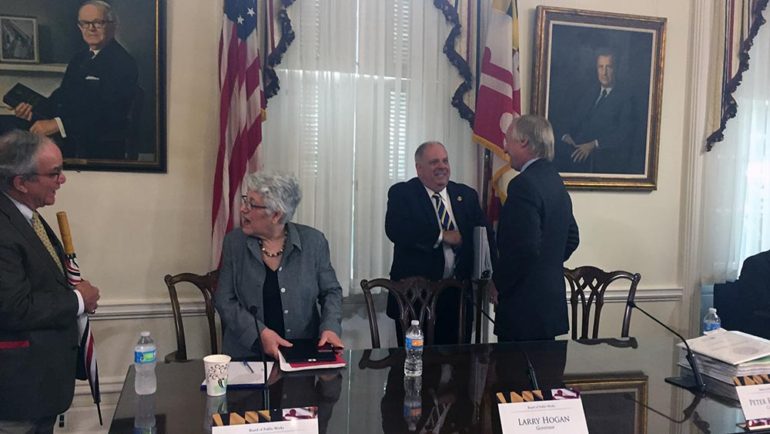ANNAPOLIS, Maryland — The Maryland Board of Public Works voted unanimously Wednesday to approve $61 million in budget cuts from Gov. Larry Hogan, a Republican, after abandoning a proposal to level aid in lower-income jurisdictions.
State Treasurer Nancy Kopp said the board heard the public’s response to the original budget cuts–totalling $67 million–and made changes accordingly, posting them the morning of the meeting. Democrat lawmakers had argued the previous proposal took funding from cash-strapped districts like Prince George’s County and Baltimore.
The updated cuts, the board said, are part of an effort to decrease spending ahead of an expected shortfall of $742 million.
“This pattern of overspending is simply unsustainable,” said David Brinkley, Maryland’s secretary of budget and management.
“We can’t forget the fact that we continue to live in very uncertain financial times,” Comptroller Peter Franchot said. Franchot and Kopp, both Democrats, serve on the Board of Public Works with Hogan. The board is available, when the General Assembly is not in session, to rein in state spending, said Sheila McDonald, the board’s executive secretary.
The governor, by law, is not permitted to reduce any appropriation by more than 25 percent. His biggest cut, percent-wise, would have been a 3.6 percent reduction to a type of local aid known as disparity grants. He rescinded about $6 million of these planned disparity grant cuts this week.
Instead, all budget cuts now hover between 0.1 and 2.5 percent. The $61 million in cuts represents a tiny fraction of the state’s $43.5 billion budget.
The largest dollar reduction–$22 million–hits the Department of Health. But close to half of that number, Brinkley said, comes from $10 million in Medicaid savings due to shorter hospital stays.
In addition, 30 vacant positions at public colleges and universities are being eliminated, saving $8 million, while another $8 million is being cut from the Department of Public Safety and Correctional Services.
Though aid to K-12 public schools is not impacted by the cuts, a planned increase in funding to private colleges under the Sellinger Program, a state formula to distribute aid to private, nonprofit colleges, has been sliced in half–from $4 million to $2 million. (Though the program itself is still getting $48 million, according to the Department of Budget and Management.)
State officials will likely release a forecast of Maryland’s finances in late September, when the Board of Revenue Estimates gives its report on tax collections. That forecast often influences budget decisions in the General Assembly when the legislative session reconvenes in the winter
In other action:
–The board approved more than $1 million in funding for Baltimore City Public Safety and Correctional Facilities after the city’s central booking saw an increase in contraband like drugs, cell phones, and weapons. “Inmates breach windows and drop bedding or string to ‘fish’ for contraband items from conspirators in the street below,” according to the Board of Public Works agenda.
–An additional $17 million was allotted for the construction of the new Cole Field House at the University of Maryland, College Park.
–$71 million was allocated to Mansfield Oil Co. for the distribution of various fuel products, including motor fuels and heating oil.
–$4 million was granted to the Maryland Zoo in Baltimore to assist in funding the design, construction, and equipping of infrastructure improvements for the exhibits and operations of the zoo.
–Close to $10 million was allotted for the repair and maintenance of hybrid buses.

